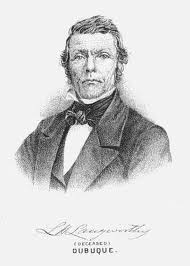Encyclopedia Dubuque
"Encyclopedia Dubuque is the online authority for all things Dubuque, written by the people who know the city best.”
Marshall Cohen—researcher and producer, CNN
Affiliated with the Local History Network of the State Historical Society of Iowa, and the Iowa Museum Association.
LANGWORTHY, Edward and LANGWORTHY, Lucius Hart: Difference between pages
No edit summary |
No edit summary |
||
| Line 1: | Line 1: | ||
[[Image: | [[Image:LHLANG.jpeg|left|thumb|150px|Lucius Hart Langworthy. Photo courtesy: Bob Reding]]LANGWORTHY, Lucius Hart. (Hopkinton, NY, Feb.,l807--Dubuque, IA, June 30, 1865). Langworthy, one of Iowa's first settlers, in an article entitled" A Vision" first used the word "Iowa" to name the new territory west of the [[MISSISSIPPI RIVER]]. | ||
[[ | Langworthy constructed the first frame house and first school in Iowa and served in the Territorial Legislature of Wisconsin that met at Burlington. He was appointed Dubuque's first sheriff in 1834 and owned an interest in the [[DUBUQUE VISITOR]] and a steamboat, the "Heroine." Greatly interested in [[RAILROADS]], Langworthy worked with others including [[PLUMBE, John Jr.|John PLUMBE, Jr.]] to generate interest in a railroad line to the Pacific coast. He was one of the delegates who traveled to Washington, D. C. to obtain a grant for the Pacific Railroad, a line in which he was an original incorporator. In 1855 he was a director of the [[DUBUQUE AND SIOUX CITY RAILROAD]] and later served as president of the [[DUBUQUE WESTERN RAILROAD]]. He was one of the first directors of the [[MINERS' BANK]]. An historian, he recorded much of the early history of the area and frequently gave lectures on literary and historical topics. | ||
Langworthy and his brother [[LANGWORTHY, James|James LANGWORTHY]] were partners in their [[MINING]] activities and very successful when their brothers [[LANGWORTHY, Edward|Edward LANGWORTHY]] and [[LANGWORTHY, Solon|Solon LANGWORTHY]] joined them. Involved in many businesses, the J. L. Langworthy and Bros. in 1854 paid one-twelfth of all the tax collected in Dubuque. | |||
-- | --- | ||
Source: | Source: | ||
Hudson, David; Bergman, Marvin; Horton, Loren. ''The Biographical Dictionary of Iowa''. Iowa City: University of Iowa Press, 2008 | Hudson, David; Bergman, Marvin; Horton, Loren. ''The Biographical Dictionary of Iowa''. Iowa City: University of Iowa Press, 2008 | ||
[[Category: Business Leader]] | [[Category: Business Leader]] | ||
[[Category: Miner]] | |||
Revision as of 23:39, 6 May 2013
LANGWORTHY, Lucius Hart. (Hopkinton, NY, Feb.,l807--Dubuque, IA, June 30, 1865). Langworthy, one of Iowa's first settlers, in an article entitled" A Vision" first used the word "Iowa" to name the new territory west of the MISSISSIPPI RIVER.
Langworthy constructed the first frame house and first school in Iowa and served in the Territorial Legislature of Wisconsin that met at Burlington. He was appointed Dubuque's first sheriff in 1834 and owned an interest in the DUBUQUE VISITOR and a steamboat, the "Heroine." Greatly interested in RAILROADS, Langworthy worked with others including John PLUMBE, Jr. to generate interest in a railroad line to the Pacific coast. He was one of the delegates who traveled to Washington, D. C. to obtain a grant for the Pacific Railroad, a line in which he was an original incorporator. In 1855 he was a director of the DUBUQUE AND SIOUX CITY RAILROAD and later served as president of the DUBUQUE WESTERN RAILROAD. He was one of the first directors of the MINERS' BANK. An historian, he recorded much of the early history of the area and frequently gave lectures on literary and historical topics.
Langworthy and his brother James LANGWORTHY were partners in their MINING activities and very successful when their brothers Edward LANGWORTHY and Solon LANGWORTHY joined them. Involved in many businesses, the J. L. Langworthy and Bros. in 1854 paid one-twelfth of all the tax collected in Dubuque.
---
Source:
Hudson, David; Bergman, Marvin; Horton, Loren. The Biographical Dictionary of Iowa. Iowa City: University of Iowa Press, 2008


